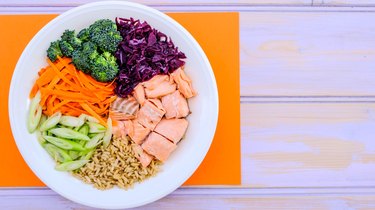
Though your cholesterol levels aren't totally determined by what you eat, it still plays a role. Enter the Therapeutic Lifestyle Changes (TLC) diet, a program that supports good cholesterol levels and overall heart health. But what is the TLC diet, exactly?
Here, we'll break down how the program works, what you can eat on the TLC diet and offer a sample day's menu to get you started.
So, What Is the TLC Diet?
The TLC diet was created by the National Institutes of Health (NIH) with the goal of helping followers lower their cholesterol through heart-healthy foods and lifestyle modifications. The plan consists of mainly whole foods that are high in soluble fiber and low in saturated fat and — you guessed it — cholesterol, but it otherwise allows a good deal of freedom in food choices.
The TLC diet is safe for just about everyone and has been proven to help lower cholesterol as well as the risk of heart disease and stroke, according to the NIH.
Unlike other diets focused on weight loss, the TLC diet is meant to be a sustainable lifestyle shift that people can stick to in the long term. These are the core tenets of the program, per the NIH:
- 25 to 30 percent of your daily calories should come from fat, specifically unsaturated fat in the form of vegetable oils like canola, avocado, olive, corn, sunflower and safflower.
- Less than 7 percent of your daily calories should come from saturated fat (think butter, cheese and fatty meats).
- Daily cholesterol intake is limited to 200 milligrams or less per day. Cholesterol is found in all animal products. For reference, one whole egg contains about 186 milligrams of cholesterol, per the USDA.
- Completely avoid trans fat, a manufactured fat found in processed foods. Check food labels and skip any foods with a partially hydrogenated oil on the ingredients list.
- Whole grains, fruits and vegetables are encouraged rather than refined carbohydrates like sugar.
- Eat plenty of soluble fiber daily.
- Get at least 30 minutes of moderate-intensity physical activity every day.
Benefits of the TLC Diet
Now you know what the TLC diet is. But why should you try it? Here are some of the program's benefits:
1. It Can Lower Cholesterol
Over the years, research suggests that the type of eating encouraged on the TLC diet is effective when it comes to both lowering cholesterol and reducing the health risks associated with it, according to the NIH.
The diet's high fiber intake may have something to do with this: Fiber has been shown to reduce cholesterol levels by binding to cholesterol molecules in the intestine, which then allows them to pass through the body, per the Mayo Clinic.
How Much Fiber Should You Eat?
Unfortunately, most Americans don't meet their daily fiber needs. Here's how much fiber adults should aim to eat every day, according to the 2020-2025 Dietary Guidelines for Americans:
- People assigned female at birth: 22 to 28 g
- People assigned male at birth: 28 to 34 g
2. It Promotes Heart Health
A December 2019 review in Circulation didn't study the TLC diet specifically, but found that a diet that emphasizes fruits, vegetables, whole grains, low-fat or fat-free dairy products, lean protein sources, nuts, seeds and liquid vegetable oils — in other words, a diet low in cholesterol, like the TLC diet — can help reduce the risk of heart disease and stroke.
The physical activity component of the diet is important, too. Indeed, a study of people with overweight and obesity concluded that exercise training, regardless of weight loss, can improve heart health for those at risk for heart disease or with current cardiovascular conditions, per January 2015 research in Progress in Cardiovascular Diseases.
3. It May Lower Blood Pressure
As a bonus, the diet may help reduce blood pressure as well. A January 2018 meta-analysis in Nutrition, Metabolism, and Cardiovascular Diseases found that eating more soluble fiber, as encouraged by the TLC guidelines, can help lower levels of both systolic and diastolic blood pressure.
4. It May Help You Lose Weight
The TLC program can also contribute to weight loss, according to the NIH. That's because regular activity and eating nutritious foods can create a daily calorie deficit to help you burn more calories than you take in, which results in weight loss.
Frequent exercise can also help lower your levels of bad cholesterol and triglycerides while raising your levels of good cholesterol, all of which can help you lose weight.
5. It's Flexible
The diet doesn't restrict any of the main food groups and includes a lot of flexibility with food choices, both of which make it a sustainable plan to stick to in the long term.
6. It May Improve Blood Sugar Regulation
Those with type 2 diabetes may see particular benefits when following the TLC diet, especially with a slight tweak.
A small study of 31 people with the condition found that when they followed the TLC diet and replaced red meat with legumes, they both lowered their cholesterol levels and improved their blood sugar control, according to October 2014 research in the European Journal of Clinical Nutrition.
Tip
If you have a medical condition, take medications or are pregnant or breastfeeding, it’s always best to check with your doctor and/or a registered dietitian to make sure the TLC diet is right for you.
Potential Risks
There are also a few potential downsides to the program, including:
1. It Can Be Difficult to Track Nutrients
Even though the TLC diet doesn't restrict food groups and allows for flexibility in your meal choices, it can be difficult to keep track of whether you're adhering to the diet's daily nutrient allotments.
For instance, it may be tricky to count how many milligrams of cholesterol you eat a day if you haven't monitored your intake in the past.
2. The Research Is Outdated
Though there is evidence to suggest that different elements of this eating plan support your health in numerous ways, there's not much recent research studying the TLC diet specifically.
Accordingly, new research is needed to better support the diet's purported health effects.
What Can You Eat on the TLC Diet?

At its core, the program focuses on eating food that is low in saturated fat and cholesterol. Here's what you can eat on the TLC diet:
1. Fat
- Olive oil, canola oil, avocado oil and safflower oil
- Avocados
- Nut butter
- Seeds and nuts
- Fatty fish like salmon, trout, herring and mackerel
2. Protein
- Beans
- Lentils
- Soy products
- Skinless chicken and turkey breast
- Fish
- Egg whites
- Low or non-fat dairy
- Lean cuts of pork and red meat on occasion
3. Carbohydrates
Complex carbohydrates are recommended on the TLC diet, meaning carbs that come from whole grains and are naturally high in fiber. These include:
- Oatmeal
- Fruit
- Vegetables
- Lentils
- Beans
- Whole grain and whole wheat foods (think pastas and bread)
- Quinoa
- Brown rice
Now that you know what you can eat on the TLC diet, here's a sample menu to get you started:
Breakfast
- Supercharged Oatmeal with a banana
- Fat-free latte
Lunch
- Turkey Tacos
- 1 cup carrot sticks
- 1 apple
Snack
Dinner
- Baked Salmon with asparagus and quinoa
- Salad made with 1½ cups romaine lettuce, ½ cup tomatoes, ¼ cucumber, 1 tablespoon vinegar and oil dressing
Snack
The Bottom Line
The TLC diet is a lifestyle program that includes balanced eating and regular exercise, both of which can contribute to lower cholesterol levels and overall heart health. It may also help regulate blood pressure and blood sugar levels, and can support weight loss.
The diet consists of lean meats, fish, poultry, low-fat or non-fat dairy, veggies, fruits, whole grains and plant-based sources of fat, and suggests doing 30 minutes of activity a day.
Though it can be tricky to track your nutrient intake on the diet at first, following the program's lifestyle recommendations in the long term may help improve or sustain your wellbeing.
Is this an emergency? If you are experiencing serious medical symptoms, please see the National Library of Medicine’s list of signs you need emergency medical attention or call 911.